Goals, Milestones, and Transitions
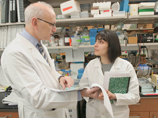
Faculty Member Stephen Nimer and First-Year Student Armine Matevossian
The goal of our graduate program is to increase the pace of translating laboratory findings into clinical practice. In order to accomplish this goal, a unique curriculum has been devised. It provides PhD researchers with the basic science training that they need to be successful bench scientists while incorporating a strong clinical perspective. Our students learn of the connection between the biology of human disease and its clinical presentation, the challenges of clinical treatment, the workings of patient-oriented research, the process of developing pharmaceuticals, and how an understanding of human physiology influences specific modes of intervention.
Gerstner Sloan Kettering has a unique, integrated, didactic curriculum designed by a team of basic researchers and physician-scientists. The curriculum includes the following: course work, three laboratory rotations, and four clinic visits during the first year of study; constant exposure to basic and patient-oriented research through interactions with faculty and visiting investigators; the development of a clinical perspective under the aegis of a clinical mentor; and dissertation research.
Special emphasis is placed on the development of a self-reliant approach to learning, the development of skills in critical analysis and logic, and the integration of basic science knowledge with human disease physiology.
In spring 2009, we watched as students from our three classes reached career milestones within this curriculum — preparing to select a thesis mentor, declaring dissertation research, and partnering with a clinical mentor.
Our First-Year Students
Our current first-year students arrived on July 28, 2008 and during their first laboratory rotation began laying the foundation for developing a dissertation. After five weeks of bench work, they entered the classroom to tackle the core course, taking breaks from this didactic phase of the curriculum to return to bench work for two more laboratory rotations during the year. Added to this rigorous schedule, students made four visits to the clinic to observe physicians caring for patients.
This intense first-year curriculum prepares students to select a thesis mentor and transition to full-time research at the beginning of their second year.
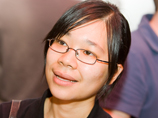
Isabel Lam
Thoughts from First-Year Student Isabel Lam
The integrative nature of the core course is a great way to be exposed to the different aspects of biology, from genes and proteins to the clinical aspects of cancer biology. It is a privilege to have distinguished scientists and leaders in the field as lecture instructors and participants in journal article discussions. The scientific reasoning skills gained are clearly having an impact on my approach to laboratory research. This became apparent quickly — just after completing the first half of the core course.
Complementing this experience is the opportunity to be immersed in the greater scientific community — meeting guest speakers and attending seminars not only at Sloan Kettering, but at the New York Academy of Sciences and nearby institutes.
The nurturing environment of the program has also contributed to my first-year experience, whether bonding as a class, having regular informal meetings with the dean, or interacting with faculty who are seriously committed to the program and their roles as mentors. Overall I’m very satisfied with my decision to come to Gerstner, and I’m impressed at how much I’ve grown as a scientist-in-training over the past ten months.
Our Second-Year Students
The major task in the second year is to begin thesis research, prepare a written thesis proposal, and defend it. This spring 11 students reached this milestone.

Muge Akpinar
Department
Molecular Biology
Mentor
John H.J. Petrini

Nick Gauthier
Department
Computational Biology
Mentor
Chris Sander

Yvonne Gruber
Department
Developmental Biology
Mentor
Lorenz P. Studer

Karen Hunter
Department
Cancer Biology and Genetics
Mentor
Johanna Joyce

Alex Miller
Department
Structural Biology
Mentor
Stephen B. Long

Semanti Mukherjee
Department
Cancer Biology and Genetics
Mentor
Robert J. Klein

Jennifer Nnoli
Department
Memorial Hospital Research
Mentor
Jacqueline Bromberg

Sadia Rahman
Department
Molecular Biology
Mentor
Prasad V. Jallepalli

Heather Scherr
Department
Developmental Biology
Mentor
Alexandra L. Joyner

Ly Vu
Department
Molecular Pharmacology and Chemistry
Mentor
Stephen D. Nimer

Shannon Yu
Department
Developmental Biology
Mentor
Mary K. Baylies
Our Third-Year Students
At the end of the second year, students choose clinical mentors who oversee their clinical apprenticeships. The choice of the clinical mentor is guided in large part by the student’s thesis topic. The goals of the clinical apprenticeship are to encourage students to develop a clinical perspective on how bench work can be applied to treatments for patients and gain a true appreciation for the challenges physicians face in the clinic.
Below three of our third-year students who have completed the first year of their clinical apprenticeship share their thoughts on the impact this component of the curriculum has had on their studies.
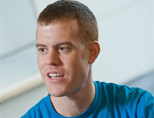
Jim Dowdle
Thesis Mentor
Scott Keeney
Clinical Mentor
Jason Konner
A major component of my clinical apprenticeship has been monthly meetings with Dr. Konner to discuss science and medicine. I have explained the details of my thesis work to Dr. Konner and keep him up to date on my progress. Dr. Konner will undoubtedly prove to be an invaluable resource with whom to discuss my project. He attended my Graduate Student Seminar and plans to attend my presentations to my colleagues in Dr. Keeney’s lab. This is another avenue for Dr. Konner to learn about my research.
On the flip side, Dr. Konner has shared with me his clinical duties involving gynecologic cancers and current treatment modalities. Since germ-cell tumors are the most relevant to my work in the meiosis field, Dr. Konner has discussed with me the rare instances in which he has treated patients with germ-cell tumors and the unique challenges these cases pose.
I have shadowed Dr. Konner in his clinic and plan to do so several times a year to observe how patients are diagnosed and treated, and to discuss how advancing research in the field is translating to the clinic. As a corollary to our discussions and knowledge sharing, we are exploring avenues for possible collaborations that will encompass my current research and Dr. Konner’s clinical interests.
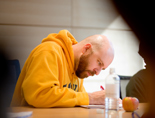
Jeff Smith
Thesis Mentor
Alan Hall
Clinical Mentor
Jacqueline Bromberg
My clinical mentor, Dr. Jackie Bromberg, maintains an active outpatient breast oncology clinic in addition to a research laboratory. I shadow Dr. Bromberg monthly in the clinic to understand breast cancer from the clinical and patient perspectives. To better understand patient treatment options I will begin to attend weekly Disease Management Team meetings, which will also allow me to understand the likelihood that certain patients will be able to enroll in clinical trials. These meetings also expose me to the weaknesses in treatment options and where translational research might have the greatest benefit. Dr. Bromberg’s expertise using mouse models of breast cancer is an excellent resource to help ensure the success of my thesis project.
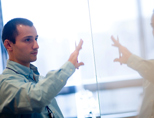
Dimiter Tassev
Thesis Mentor
Nai-Kong Cheung
Clinical Mentor
Ronald DeMatteo
After several meetings, Dr. DeMatteo and I have discussed and embarked on a variety of things. I have been able to sit in on clinical trial meetings he has had with a pharmaceutical company concerning the use of a therapeutic agent in the adjuvant setting for the treatment of gastrointestinal stromal tumor (GIST). Because my career interests are in the area of clinical investigation, this experience has been invaluable to me. I have had the opportunity to shadow Dr. DeMatteo in the clinic. In the near future, I plan to observe Dr. DeMatteo and his team during a surgery. We have also discussed several interesting projects on which we could collaborate. For example, the protein B7-H3 is of great interest in Dr. Cheung’s laboratory. I recently began to study the regulation of this protein in monocyte-derived dendritic cells. Because Dr. DeMatteo has a focus on liver-derived dendritic cells, we have briefly discussed my interests in looking at B7-H3 expression and regulation in these cells.
Beyond the Curriculum
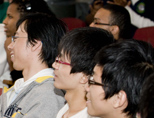
Focus Forward audience members await presentations by students
Focus Forward Science Expo
Gerstner Sloan Kettering hosted the seventh annual Focus Forward Science Expo on May 28. Focus Forward, a program of United Way of New York City, partners with the New York City Department of Education and community-based organizations to help at-risk students overcome barriers to attending and succeeding in school. Third-year student Eric Alonzo spearheaded this event.
The Expo’s audience of students, parents, teachers, and United Way of New York City staff were welcomed by Associate Dean C. Gita Bosch who challenged the students to continue to pursue their interest in science and pointed out that “it can be most rewarding as you become part of the solution and work to improve the human condition.”
The students who presented their research came from schools across the city — Lower East Side Prep (Manhattan), Health Opportunities High School (Bronx), CS 57 (Bronx), Enterprise, Business and Technology High School (Brooklyn), and PS 198 (Bronx). The students’ projects represented their diverse scientific interests — robotics, energy conservation, DNA technology, and the ecological problems caused by starfish.
On the Lighter Side
Students went paintballing in the spring and despite the inclement weather, a good time was had by all, including the dean.